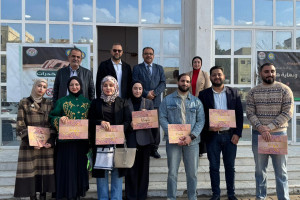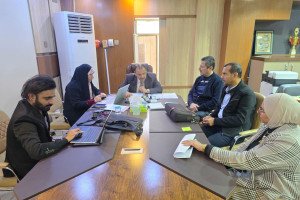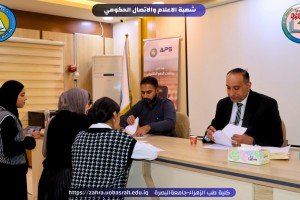
Under the patronage of the President of Basra University, Professor Muhannad Jawad Kadhim, and supervised by the Dean of Al-Zahraa College of Medicine, Assistant Professor Jawad Ramadan Fadhil, and coordinated with the Scientific Associate Lecturer Dr. Ihsan Mardan, the Department of Microbiology at Al-Zahraa College of Medicine, in collaboration with the Center for Development and Continuing Education, organized an informative scientific lecture titled "Microbial Food Poisoning" on Thursday, March 13, 2025.
*Importance of the Event and Its Objectives *
Food poisoning is one of the most prominent global health challenges, especially with the increasing cases of microbial food contamination and their diverse sources. This lecture was part of the ongoing efforts of Al-Zahraa College of Medicine to enhance health awareness and build an academic community capable of addressing health risks through scientific education.
The lecture aimed to:
- Shed light on the main causes of microbial food poisoning.
- Educate attendees about the most dangerous pathogens responsible for foodborne illnesses.
- Provide preventive and therapeutic solutions based on scientific evidence.
*Speakers and Discussion Topics *
The lecture was presented by a group of distinguished academics specializing in microbiology:
1. Dr. Ban Mohammed Saleh: Discussed the mechanisms of microbial spread in food, focusing on environmental conditions that promote growth.
2. Dr. Firqad Majid Al-Hamdani: Reviewed the most common pathogens such as Salmonella, Escherichia coli, and Staphylococcus , explaining their effects on the human body.
3. Dr. Zainab Khalid Khalil: Addressed ways to prevent food poisoning, from personal hygiene to food safety standards in both domestic and industrial kitchens.
*Scientific Content: A Journey into the World of Microbes *
The lecture was divided into four main sections:
1. How Does Food Poisoning Occur?
The speakers explained that microbial contamination can occur at any stage of food production, from farming and harvesting to storage, transportation, preparation, and serving. They emphasized that warm, humid conditions provide the ideal environment for bacteria and fungi to thrive.
2. Hidden Microbes: The Invisible Enemies
The lecture focused on classifying microbes based on their severity, presenting practical examples of past foodborne outbreaks, such as poisoning by Clostridium perfringens in canned foods.
3. Diagnosis and Symptoms: When Should We Be Alert?
Common symptoms of food poisoning, such as nausea, vomiting, diarrhea, and fever, were explained, with distinctions made between bacterial and viral infections. The latest laboratory techniques used for diagnosing cases were also highlighted.
4. Prevention is Better Than Cure
The lecture concluded with practical advice to reduce the risks of food poisoning, including:
- Washing hands and surfaces before preparing food.
- Separating raw foods from cooked ones.
- Cooking meat at appropriate temperatures.
- Storing food in the refrigerator at temperatures below 5°C.
*Target Audience and Engagement *
The lecture targeted faculty, administrative staff, and students, receiving noticeable interaction through a Q&A session where attendees shared their daily experiences with food safety issues. The organizers also announced that similar events would continue as part of a series of lectures covering diverse health-related topics.
*Conclusion: Towards an Informed and Healthy Community *
This initiative reflects Al-Zahraa College of Medicine's commitment to its societal role in promoting health awareness, as emphasized by the Dean of the College in his closing remarks:
Awareness is the first step in combating epidemics. We strive to empower community members with scientific knowledge that contributes to reducing rates of foodborne illnesses.
Such events are not merely academic lectures but investments in human health, fostering a generation capable of making informed decisions to protect themselves and their communities.
---
Held on Thursday, March 13, 2025, at 9:30 AM in the hall of Al-Zahraa College of Medicine.



.jpeg)
.webp)
